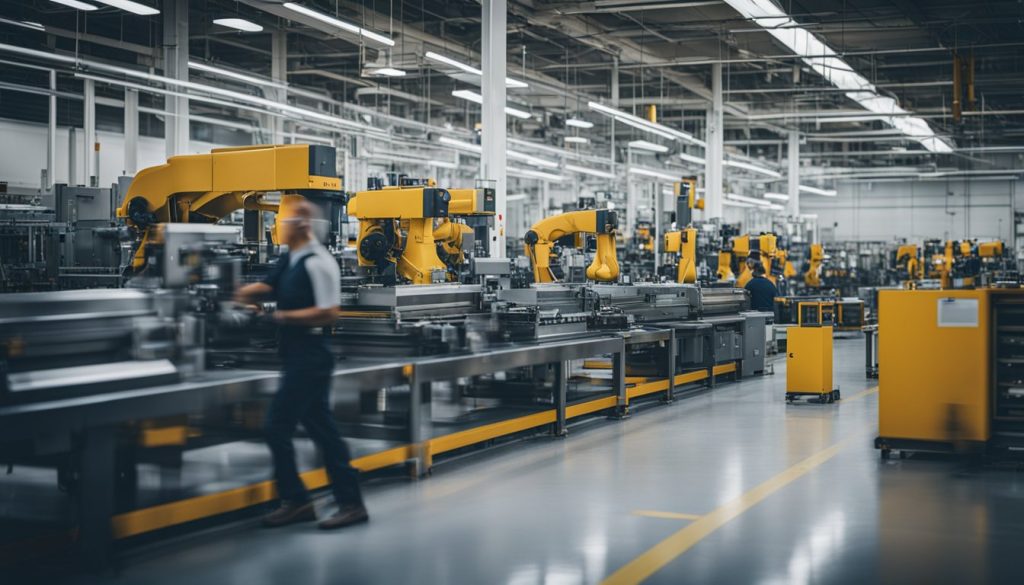Oakville, Ontario Current Trends and Economic Impact
Oakville, Ontario is experiencing a major shift in its manufacturing sector. We’re seeing significant changes that will shape the city’s industrial landscape for years to come. The local automotive industry is investing billions to transform existing facilities into hubs for producing electric vehicles. This move signals a new era for manufacturing in the region.
The transformation of Oakville’s manufacturing base is set to create many new jobs. It will also require workers to learn new skills to keep up with technological advancements. We expect these changes to have ripple effects throughout the local economy, from suppliers to service industries.
These developments put Oakville at the forefront of an evolving industry. As the city adapts to new production methods and technologies, it’s poised to become a key player in the future of automotive manufacturing. The coming years will be crucial in determining how well Oakville can capitalize on these opportunities.
Historical Context of Manufacturing in Oakville

Manufacturing has played a crucial role in shaping Oakville’s economy and identity. The town’s industrial heritage is deeply rooted in automotive production, with a major assembly complex at its heart.
Evolution of the Oakville Assembly Complex
The Oakville Assembly Complex began operations in 1953. It quickly became a cornerstone of local industry. The facility has produced numerous vehicle models over the decades. Its workforce grew steadily, reaching thousands of employees at its peak.
The complex expanded several times to meet growing demand. New technologies and production methods were introduced regularly. This kept the plant competitive in a rapidly changing market.
We’ve seen the facility adapt to shifting consumer preferences. It moved from larger vehicles to more fuel-efficient models. The plant’s output has been vital to the national auto sector.
Legacy of Ford in Canada
The automotive industry’s impact on Oakville extends beyond the assembly plant. It created a robust supply chain of parts manufacturers and service providers. This network supported thousands of additional jobs in the region.
The presence of a major automaker attracted skilled workers to the area. It spurred development of technical education programs. Local schools and colleges tailored curricula to meet industry needs.
We can trace much of Oakville’s growth to this industrial foundation. The town’s population increased significantly in the decades following the plant’s opening. New neighborhoods and infrastructure were built to accommodate the expanding workforce.
Oakville’s Transition to Electric Vehicle Production

The automotive industry in Oakville is undergoing a major shift towards electric vehicle production. This transformation involves significant investment, a focus on new technologies, and potential impacts on the local economy.
Investment and Growth in EV Manufacturing
A C$1.8 billion investment is set to transform Oakville’s existing assembly complex into a high-volume hub for electric vehicle manufacturing. The retooling and modernization process will begin in the second quarter of 2024.
The revamped facility will be renamed the Oakville Electric Vehicle Complex. It will include:
- A new 407,000 square-foot battery plant
- Updated assembly buildings
- State-of-the-art paint facilities
This investment marks the first time a full-line automaker has announced plans to produce passenger EVs in Canada for the North American market.
Ford+ Transformation and Electric Vehicle Focus
The Oakville transformation is part of a larger strategy to scale up electric vehicle production. The goal is to make EVs more accessible to millions of customers.
Key aspects of this transition include:
- Focus on next-generation electric vehicles
- Production of both vehicles and battery packs
- Possible future expansion into electric vehicle battery cell production
This shift aligns with the broader industry trend towards electrification. It positions Oakville as a crucial player in the growing EV manufacturing ecosystem.
Impact on Local Economy and Employment
The transition to EV production is expected to have a significant impact on Oakville’s economy and job market. While specific numbers aren’t available, the investment is likely to create and maintain many good-paying jobs in the auto sector.
The new facility will require workers skilled in:
- Electric vehicle assembly
- Battery pack production
- Advanced manufacturing techniques
This shift may also attract related businesses to the area, potentially creating an EV manufacturing cluster in Oakville. The ripple effects could boost local suppliers and service providers, further strengthening the regional economy.
Technological Advancements and Production Capabilities

We’re witnessing remarkable progress in electric vehicle manufacturing. New facilities and partnerships are driving innovation in battery technology and high-volume production methods.
Development of BlueOval SK Battery Park
The new battery production complex is set to revolutionize EV manufacturing. It will span over 1,500 acres and create approximately 5,000 jobs. This facility will produce advanced battery cells and modules for next-generation electric vehicles.
The park aims to achieve an annual production capacity of 129 gigawatt-hours. This output is enough to power over 1 million electric vehicles annually. The project represents a significant step forward in scaling up EV production capabilities.
Role of LG Energy Solution and High-Volume Manufacturing
A key partnership is driving advancements in battery technology. This collaboration focuses on developing and producing high-energy density batteries for future EVs. The joint venture aims to lower battery costs while increasing energy density and overall performance.
We’re seeing the implementation of cutting-edge manufacturing processes. These include automated assembly lines and advanced quality control systems. Such innovations are crucial for achieving the high production volumes needed to meet growing EV demand.
Innovations in Battery Cell Production
New battery chemistries are being explored to enhance EV performance. Research is ongoing into nickel cobalt manganese (NCM) and lithium iron phosphate (LFP) batteries. These advancements aim to increase range, reduce charging times, and improve overall battery life.
We’re also seeing progress in battery pack assembly techniques. New designs allow for more efficient cooling and better integration with vehicle platforms. These improvements contribute to better performance and safety in electric vehicles.
Vertical integration of the battery supply chain is another key focus. This strategy helps reduce costs and ensure a steady supply of critical components.
Regional Impact and Global Position

Oakville’s manufacturing sector plays a crucial role in shaping the regional economy and positioning Canada on the global stage. The city’s contributions to electric vehicle (EV) production and automotive innovation have far-reaching implications.
The Canadian EV Production Landscape
Our nation’s EV production is gaining momentum. Oakville’s retooling efforts are transforming it into a high-volume manufacturing hub. We’re seeing a shift towards a target of producing 2 million EVs annually. This ambitious goal puts us on track to compete with other major producers worldwide.
The site transformation in Oakville is a key piece of the puzzle. It’s helping to build a robust electric vehicle supply chain across the country. This move is creating new jobs and securing existing ones in the automotive sector.
Our production capabilities are expanding rapidly. We’re aiming to reach a global production run rate that will cement our position as a leader in EV manufacturing.
Partnership with Unifor and the Canadian Autoworkers
We’ve formed strong partnerships with labor unions to ensure a smooth transition. Unifor plays a vital role in representing the interests of Canadian autoworkers. Together, we’re working on retraining programs to prepare our workforce for the EV revolution.
These collaborations are crucial for maintaining labor stability. They help us adapt to new technologies without compromising job security. Our partnerships focus on:
- Skill development for EV production
- Negotiating fair wages and benefits
- Ensuring workplace safety in new manufacturing processes
We’re committed to keeping our skilled workforce at the forefront of automotive innovation.
Oakville within the North American and Global EV Markets
Oakville is positioning itself as a key player in North American EV production. Our output is set to contribute significantly to the continent’s total EV manufacturing capacity. We’re part of a larger strategy to compete with other global producers.
Our focus on high-volume manufacturing is attracting attention from international markets. We’re seeing increased interest in our EVs from various countries. This global demand is driving our production targets higher.
Oakville’s role extends beyond just manufacturing. We’re becoming a hub for EV-related research and development. This dual focus on production and innovation is strengthening our position in the global automotive industry.



